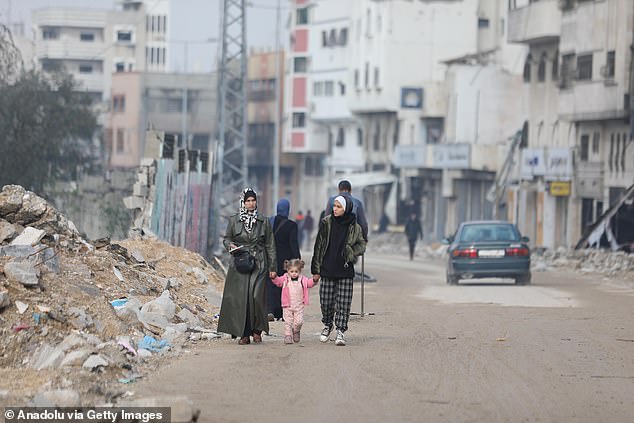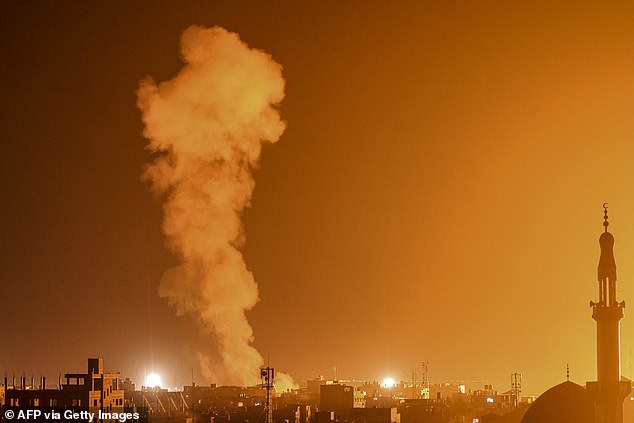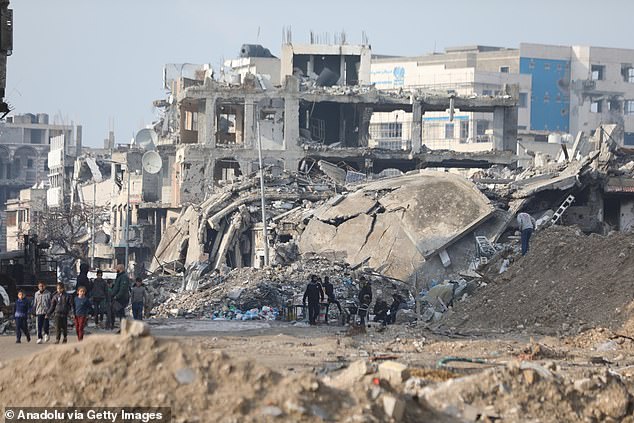Hamas proposes three 45-day ceasefires, leading to end of war, that will see remaining Israeli hostages freed in return for Palestinian prisoners and IDF withdrawal from Gaza
Hamas has proposed a ceasefire plan that would silence weapons in Gaza for four and a half months, leading to an end to the war and the release of the remaining hostages in exchange for Palestinian prisoners and the withdrawal of the IDF from Gaza.
It comes in response to a proposal sent last week by Qatari and Egyptian mediators and backed by the United States and Israel.
According to a draft document seen by Reuters, the Hamas counterproposal envisions three phases, each lasting 45 days.
The proposal would see terrorists exchange the remaining Israeli hostages they captured on October 7 for Palestinian prisoners.
Reconstruction of Gaza would begin, Israeli forces would withdraw completely, and bodies and remains would be exchanged.
The proposal would see terrorists exchange the remaining Israeli hostages they captured on October 7 for Palestinian prisoners.

Palestinians return to their neighborhood after Israeli forces withdrew from Shuja’iyya neighborhood, inspecting destroyed buildings and roads due to Israeli attacks in Gaza City, Gaza on Tuesday

Smoke rises Wednesday during the Israeli bombardment of Rafah in the southern Gaza Strip
US Secretary of State Antony Blinken arrived in Israel overnight after meeting with the leaders of mediators Qatar and Egypt in the most serious diplomatic effort of the war yet aimed at reaching an extended ceasefire. Details of Hamas’s counteroffer have not previously been reported.
Under Hamas’s counterproposal, all Israeli female hostages, men under 19, the elderly and the sick, would be released during the first phase of 45 days in exchange for the release of Palestinian women and children from Israeli prisons.
The remaining male hostages would be released during the second phase and the remains will be exchanged in the third phase. By the end of the third phase, Hamas would expect the parties to have reached an agreement to end the war.
The group, which governs Gaza, said in an addendum to the proposal that it wanted the release of 1,500 prisoners, a third of whom it wanted to select from a list of Palestinians given life sentences by Israel.
The ceasefire would also increase the flow of food and other aid to Gaza’s desperate civilians, who face hunger and a severe shortage of basic services.
Thirty-two of the more than 130 hostages still held by Hamas are no longer alive, according to a report.
Citing a confidential assessment conducted by Israeli intelligence officials, The New York Times reported yesterday that more hostages have been killed than previously thought.
So far, the IDF had only confirmed the deaths of 29 of the prisoners still in Gaza.
In addition to the 32 confirmed deaths, the IDF is assessing “unconfirmed intelligence” that at least 20 other hostages may also have been killed, the report said, citing four military officials speaking on condition of anonymity.

US Secretary of State Antony Blinken (L) meets with Sheikh Mohammed bin Abdulrahman bin Jassim Al Thani, Prime Minister and Minister of Foreign Affairs of Qatar, in Doha, Qatar on Wednesday

A view of the demolition as Palestinians return to their neighborhoods to search for their belongings in the Shuja’iyya district after Israeli forces withdrew from the area on Wednesday in Gaza City, Gaza
The officials said the families of those killed have all been informed of their deaths and confirmed that most of those killed were killed in the October 7 attacks and that their bodies were taken to Gaza.
IDF spokesman Admiral Daniel Hagari said in response to the report that the IDF is “working in every possible way to bring (the hostages) home, exhausting all information about them and their conditions.”
He added: “The IDF is accompanying the families of the hostages in these complex and difficult days, and our representatives are providing the families with all confirmed information about their loved ones.”
He said the IDF has so far informed the families of 31 hostages that their loved ones have been confirmed killed.
These include 29 hostages taken by Hamas on October 7 – all announced in recent months – and soldiers Oron Shaul and Hadar Goldin, who were killed and their bodies taken by Hamas in 2014.
“To the rest of the families, we have provided accurate information about their fate and circumstances,” he added.
The Hostages and Missing Families Forum said the IDF had said before the article’s publication that 31 of the hostages, down from 32, had died.
Israel began its military offensive in Gaza after terrorists from Hamas-ruled Gaza killed 1,200 people and took 253 hostages in southern Israel on October 7.
Gaza’s health ministry says at least 27,585 Palestinians have been killed in Israel’s military campaign, while thousands more are feared buried under the rubble.
